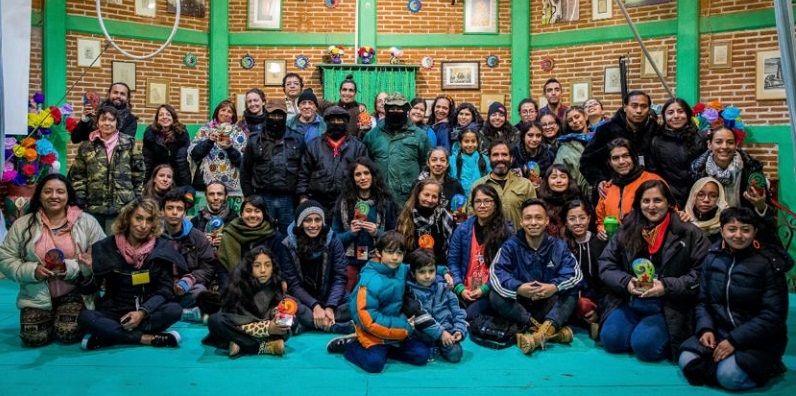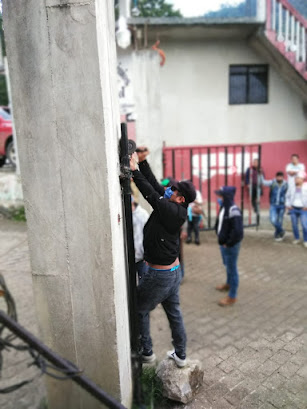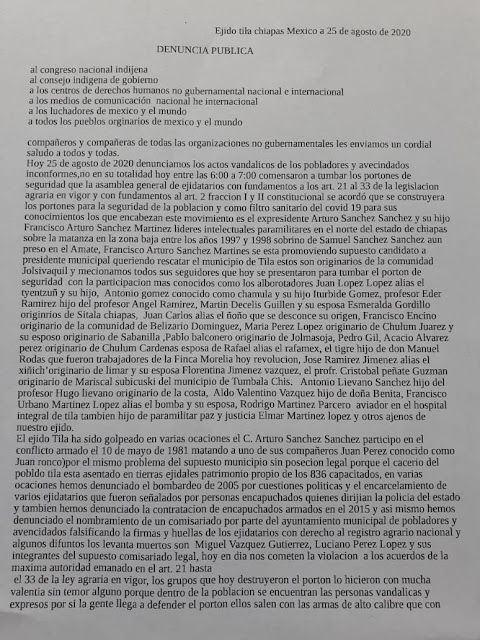
Chiapas
(Español) Denuncia de la Coordinación del CNI-CIG ante los hechos ocurridos en la comunidad de nueva Jerusalén perteneciente al ejido Peña Limonar municipio de Ocosingo Chiapas
Denuncia de la Coordinación del CNI-CIG ante los hechos ocurridos en la comunidad de nueva Jerusalén perteneciente al ejido Peña Limonar municipio de Ocosingo Chiapas, el día 18 de agosto 2020
AL EZLN EJERCITO ZAPTISTA DE LIBERACION NACIONAL
A LAS JUNTAS DE BUEN GOBIERNO (JBG)
A LOS MUNICIPIOS AUTONOMOS ZAPATISTAS
A LAS REDES DE RESISTENCIA Y REBELDÍA
A LA SEXTA NACIONAL E INTERNACIONAL
A LOS MEDIOS DE COMUNICACIÓN
A LOS ORGANISMOS DE DERECHOS HUMANOS
A LAS ORGANIZACIONES EN DEFENSA DEL TERRITORIO Y DE LA MADRE TIERRA
AL PUEBLO DE MÉXICO.
Denuncia a los tres niveles de gobierno: Hechos ocurridos en la comunidad de nueva Jerusalén perteneciente al ejido peña limonar municipio de Ocosingo Chiapas, el día 18 de agosto 2020.
Los compañeros que pertenecen al CNI (CONGRESO NACIONAL INDIGENA) estaban trabajando con sus dos hijos y su esposa en su parcela ubicado a 40 metros de su casa. Miguel espinosa Gómez, la Sra. Pascuala Pérez Gutiérrez, sus hijos: Jairo espinosa Pérez y Miguel de Jesús espinosa Pérez cuando estaban trabajando, de pronto salieron los agresores entre la maleza, José espinosa Gómez alias el (tata), Simón Pedro Espinosa Gutiérrez, José Espinosa Gutiérrez y Antonio Espinosa Gómez, hermano de Miguel Espinosa Gómez: los tres primeros que salieron entre la maleza portaban armas de fuego al parecer calibre 20 tipo escopeta, el últimos iba con un machete en la mano donde gritaba manifestando, ahora los vamos a matar a todos, de inmediato empezaron a disparar hacia nosotros, por lo que le manifesté a mi familia que saliéramos corriendo hacia la casa , entre los balazos que venia hacia nosotros lograron herir a mi hijo Miguel de Jesús Espinosa Pérez de 13 años de edad, cayo al suelo como pude logre levantar a mi hijo y llevara a la casa, en ese momento Simón Pedro Espinosa Gutiérrez volvió a cargar el arma para rematar al herido y diciendo ahora van a morir todos, en ese momento no acciono el arma y así pude salvarle la vida a mi hijo, trasladando rumbo a mi casa. Las otras personas seguían disparando hacia donde estaba mi esposa y mi hijo Jairo, nos escondimos adentros de nuestra humilde casa de madera y de lamina de zing, donde ha queda las huellas de los disparos. MIGUEL DE JESUS ESPINOSA PEREZ mi hijo de 13 años de edad recibió varios impactos de bala de arma de fuego, en el hombro, brazo , pulmón derecho y espalda. causándole heridas graves que se tuvo que trasladar y hospitalizar en la ciudad de Palenque Chiapas. Mis dos hijo y mi esposa estamos demostrando la actitud de mi hermano ANTONIO ESPINOSA GÓMEZ, JOSE ESPINOSA GOMEZ, alias el TATA. que ha hecho mucho daño a mi familia, por el solo hecho de quererme despojar de mi terreno que me dejo mi finado padre que llevo de nombre Miguel Espinosa Gutiérrez.
A N T E C E D E N T E S

(Español) Más de 450 personas y 140 organizaciones de 22 países exigen Alto a la guerra contra las comunidades zapatistas
Alto a la guerra contra las comunidades zapatistas
PRONUNCIAMIENTO
El sábado 22 de agosto del 2020, paramilitares de la Organización Regional de Cafeticultores de Ocosingo (ORCAO), saquearon e incendiaron las instalaciones del Centro de Comercio Nuevo Amanecer del Arcoiris, que se encuentra ubicado en el sitio conocido como crucero de Cuxuljá, Municipio Autónomo Lucio Cabañas, dentro del municipio oficial de Ocosingo. Hay que recordar que el 24 de febrero de 2020, la ORCAO, junto al grupo los “Chinchulines” (identificado desde hace años como paramilitar), e integrantes del partido MORENA en la región, violentaron y secuestraron a integrantes del Congreso Nacional Indígena (CNI), esto en el contexto de las Jornadas en defensa del territorio y la Madre Tierra “Samir somos todas y todos”, convocadas por el EZLN y el CNI. Todo quedó documentado en la denuncia publicada en la página Enlace Zapatista (ver: https://enlacezapatista.ezln.org.mx/2020/02/27/pronunciamiento-ante-el-secuestro-de-miembros-del-cni-en-chilon-chiapas-por-su-participacion-en-las-jornadas-samir-somos-todas-y-todos/).
Esta nueva agresión forma parte de la intensificación de la guerra de desgaste en el estado de Chiapas, caracterizada por el incremento de la violencia de grupos paramilitares y del crimen organizado, cómo oportunamente ha documentado el Centro de Derechos Humanos Fray Bartolomé de las Casas (ver: https://frayba.org.mx/agresiones-armadas-en-aldama/).
La difusión de calumnias contra el Ejército Zapatista de Liberación Nacional (EZLN), también forma parte de esa guerra contrainsurgente que se realiza en distintos frentes y formas: directa e indirecta, abierta y encubierta; mediática, política, económica y militar. Este escenario de guerra no es exclusivo del estado de Chiapas. Como puede consultarse en la página del Congreso Nacional Indígena (ver: https://www.congresonacionalindigena.org/category/denuncias/), son constantes las denuncias de los pueblos originarios y sus organizaciones frente a la violencia de los grupos criminales, paraestatales y estatales, violencia que contribuye a la fragmentación del tejido comunitario y al desgaste de las luchas contra el despojo y los megaproyectos en México.
Quienes firmamos este documento, llamamos a la sociedad civil nacional e internacional a suscribir la denuncia de estos hechos, exigir el cese de las agresiones y hostilidades a las Bases de Apoyo Zapatistas, de la destrucción de los preciados bienes comunitarios, el resultado del trabajo colectivo, que, en medio de esta crisis multifactorial, adquieren un alto valor patrimonial; igualmente, pedimos se mantengan atentas ante esta nueva escalada de la violencia contra el EZLN y el CNI, organizaciones que son un referente planetario en la defensa de la Vida y por un mundo mejor.











